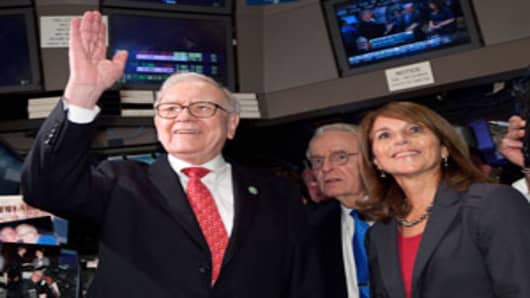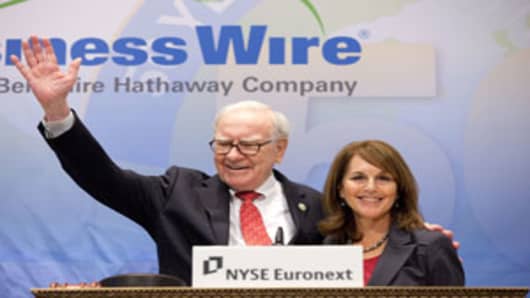This is a transcript of Warren Buffett's live interview on CNBC with Andrew Ross Sorkin on Friday, September 30, 2011. In it, Buffett says he thinks it is "very, very unlikely" the U.S. economy will go back into recession. He also reveals that Berkshire has been buying billions of dollars worth of inexpensive stocks during the third quarter, and has just started to repurchase its own shares:
SIMON HOBBS, CNBC: Let's go down to the floor. Andrew Ross Sorkin is there with a very special guest this Friday morning. Good morning, Andrew.
ANDREW ROSS SORKIN, CNBC: Good morning. We are here with the one and only, the "Oracle of Omaha," Warren Buffett. We're also here with Cathy Baron Tamraz. You're here for the 50th anniversary of Business Wire, so congratulations to you, Cathy.
CATHY BARON TAMRAZ, Business Wire Chairman & CEO: Thank you so much.
ANDREW: I want to get to you in a second and this anniversary, but I also want to get to buybacks, which are in the news this week. You just announced it. Why do it now? I think there's a big question, Buffett watchers who've seen you over many years, you have not always liked buybacks. So what is it about what's going on right now?
WARREN BUFFETT, Berkshire Hathaway CEO: Price to value. I mean, the only — the only time to do buybacks, in my view, is when you think your stock is selling well below its intrinsic business value. And we talk— we've talked about that in many annual reports over the years, and we haven't had very many opportunities to do it. Now we think that...
ANDREW: OK. So you've instituted the program, but the big question that viewers want to know is, have you actually started buying yet?
BUFFETT: We actually have.
ANDREW: You have started buying yet.
BUFFETT: Yeah, yeah.
ANDREW: OK. And how much can we expect for you to buy? I know you said that you wanted to keep a $20 billion kitty at all times. You have about $40 billion on hand right now.
BUFFETT: Yeah. Well, we don't have quite that much, but the cheaper it is, the more aggressive, generally, we will be in terms of buying. It's just like buying any other stock.
ANDREW: And how much have you bought so far?
BUFFETT: We only got the paperwork done yesterday.
ANDREW: OK. And what does this say, and then I want to get to Cathy, what does this say more in a larger picture about your ability to find elephants? You always talk about your trigger finger.
BUFFETT: That's what I'm looking for.
ANDREW: Well, I know that, but in terms of moving money into your own stock, does it mean that you're not finding the same kind of opportunities right now, given the markets?
BUFFETT: We find opportunities periodically. I mean, we did the BofA deal, we did Lubrizol, we put 9, almost $9 billion in Lubrizol. We just announced yesterday a $400 million acquisition for an insurance company. Just yesterday. We've bought, in the last quarter, the third— in the current quarter, we bought net 4 billion of common equities, which was similar to the total amount we bought in the first half. The cheaper stocks get, the better I like to buy them, whether it's our stock or somebody else's.
ANDREW: So there's still— there's still— we should still see you make a big deal.
BUFFETT: You...
ANDREW: And this is not...
BUFFETT: I sure hope so.
ANDREW: And the buyback is not an announcement that you're taking...
BUFFETT: Oh no.
ANDREW: ...money into your own stock.
BUFFETT: No.
ANDREW: OK. Cathy, Mr. Buffett bought your company in 2006. You've lasted 50 years through all sorts of different business cycles, and yet we're living now in the age of the Internet and Twitter. And the SEC has now told companies that they can actually put their press releases up online. What do you do to defend your business and, frankly, to grow your business in this environment?
TAMRAZ: Well, actually our business is growing in this environment. We also are creating websites for companies that want to put their releases online. But that's not the way to put out breaking news. And that's what we do at Business Wire. And as long as we can push that news out to the investing public, I think it's the best way to go.
BUFFETT: If I— if I want to know what's going on at Bank of America, I do not want to have a website tuned to that all day. I want to get it instantly from CNBC, and the way that they'll get it is, you know, is from Business Wire.
ANDREW: Right. I would— I would be remiss if I didn't mention that one of the other reasons you're in town is for this Obama fundraiser tonight at the Four Seasons.
BUFFETT: Right. Yeah.
ANDREW: And I wanted to ask you specifically, so many people in the business community say that the president is anti-business. Do you believe he's anti-business...
BUFFETT: No.
ANDREW: ...when you think about his rhetoric? And why not?
BUFFETT: No. Well, I mean, I...
ANDREW: Rhetoric and policies, by the way. There's so many people who have said...
BUFFETT: Oh, I mean, he took action to save General Motors and Chrysler. I mean, he backed programs that have kept the banks around and, in the process, rejuvenated the economy. He knows, and he knew it 10 years ago, to be president of the United States...
ANDREW: Right.
BUFFETT: ...particularly in the second term, you better have business doing well. And he wants it to do well.
ANDREW: So the talk of higher taxes and more regulation, you don't think is creating more uncertainty in the business community?
BUFFETT: I don't— I don't have any...
ANDREW: What do you tell the CEOs who talk to you about this?
BUFFETT: I don't have any uncertainty. We are investing at Berkshire a record $7 billion in plant and equipment this year. Never before that much; 90-plus percent is in the United States. We're seeing our businesses doing well. Business is coming back in the United States.




